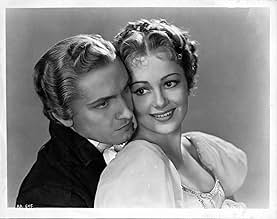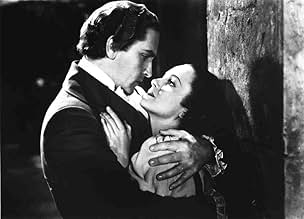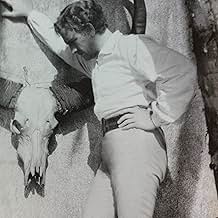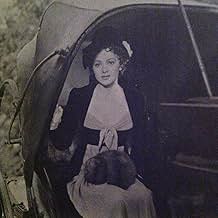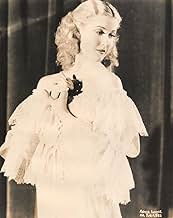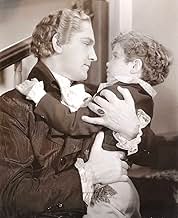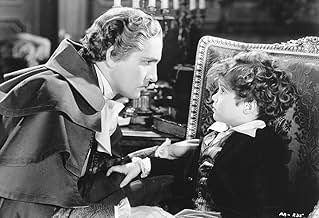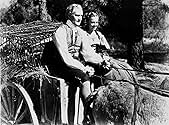IMDb-BEWERTUNG
6,3/10
2127
IHRE BEWERTUNG
Füge eine Handlung in deiner Sprache hinzuIn 18th-century Italy, an orphan's debt to the man who raised him threatens to separate him forever from the woman he loves.In 18th-century Italy, an orphan's debt to the man who raised him threatens to separate him forever from the woman he loves.In 18th-century Italy, an orphan's debt to the man who raised him threatens to separate him forever from the woman he loves.
- 4 Oscars gewonnen
- 8 Gewinne & 3 Nominierungen insgesamt
Empfohlene Bewertungen
I rented a tape of Anthony Adverse mainly to see what kind of performance the Academy was looking for in the first-awarded "best supporting actress" category. Gale Sondergaard's time on camera was actually quite brief and her villainous role required a strictly one-dimensional reading. There were no subtleties whatsoever, nor was there any need in the film for them. Ordinarily, it might seem surprising that her part would receive any attention at all, not to mention a prestigious award, but keeping in mind that Oscars in those days were to a large extent self-congratulatory spectacles passed around from studio to studio year by year, it really isn't surprising.
The film was long and episodic, as was the novel, and not particularly good at that. There was the glitz we've come to expect of course with the duels and chases thrown in for good measure. I kept wondering if the novel was written with Hollywood in mind. It's hardly readable nowadays. As far as directorial touches are concerned, it's no wonder that Mervyn LeRoy has long disappeared from anyone's pantheon. The kiddie-car version of France must have excited the Depression audiences. The film is very long and very expensive so perhaps there's something to say about that.
The film was long and episodic, as was the novel, and not particularly good at that. There was the glitz we've come to expect of course with the duels and chases thrown in for good measure. I kept wondering if the novel was written with Hollywood in mind. It's hardly readable nowadays. As far as directorial touches are concerned, it's no wonder that Mervyn LeRoy has long disappeared from anyone's pantheon. The kiddie-car version of France must have excited the Depression audiences. The film is very long and very expensive so perhaps there's something to say about that.
Fredric March stars as the title character, an orphan boy discarded due to his illegitimacy, who overcomes much adversity throughout his life. He is raised in a convent and adopted by a wealthy merchant, Edmund Gwenn, at the age of ten. He learns the business, but is shipped to Havana around the time of the French Revolution. Before he departs, it is learned that he has married the daughter of a servant, Olivia DeHavilland. He is thought lost at sea by all, but is actually in Africa running a slave trade, with his heart blackening the whole time. From there, the tale takes many twists as Anthony must find goodness in his heart again, and DeHavilland may be the key. The drama is a bit heavy-handed and some overacting is present. Claude Rains and Gale Sondergaard make great antagonists, and Sondergaard won a Best Supporting Actress Oscar for her performance.
Hervey Allen's great blockbuster novel Anthony Adverse, a major seller during the Depression Years provided both its leads, Fredric March and Olivia DeHavilland with some choice roles in their respective careers. The book turned out to be a one hit wonder for its author, but it certainly allowed him to live comfortably. Something like that other blockbuster novel Gone With the Wind did for its author which also gave Olivia DeHavilland an even bigger role in her career.
Imagine if you will a Charles Dickens hero like Pip or David Copperfield born in very humble circumstances, but escaping to lead a life of high adventure away from the Dickensian settings of Victorian Great Britain and you've got Anthony Adverse. The supporting characters in the book and film could have also come from Dickens.
Young Anthony is the product of an affair between a young officer, Louis Hayward, and the wife of a Spanish diplomat, Anita Louise. Husband Claude Rains kills Hayward in a duel and when his wife dies in childbirth, leaves the infant at a convent. The nuns give him the name of Anthony Adverse as the boy arrives on St. Anthony's Day and is a child of adversity if there ever was one.
The grown up Anthony, played by Fredric March is apprenticed to his maternal grandfather Edmund Gwenn who does not know it as doesn't March at first. A sly and cunning housekeeper, Gale Sondergaard in her screen debut, puts the puzzle together, but she's got an agenda of her own which later meshes with the dissipated and dissolute Rains.
March also falls for young Olivia DeHavilland who is an aspiring opera singer who also wants some of the finer things in life. Though they marry and have a son, both take different paths on a quest for material security and comfort.
Anthony Adverse was a good follow up role for Olivia DeHavilland after Captain Blood. In both she's a crinolined heroine which she was destined to be cast as in her career at Warner Brothers. Still this part has a lot more to it than most of those she was doing at that time in her career.
March was 39 when he made Anthony Adverse, still he's a good enough player to gradually age into the part. The story does take place over a long period of years, right into the Napoleonic era from 1773 when Anthony is born.
Edmund Gwenn's character is pure Dickens, the Scot's merchant John Bonnyfeather (even the name) could easily have been Fezziwick from A Christmas Carol. Gale Sondergaard as the housekeeper could have been the bloodless Jane Murdstone combined with the vengeful Madame DeFarge.
Sondergaard won the first Best Supporting Actress Oscar given out for her performance. It set a pattern of villainous female roles which she played until she got blacklist troubles in the late Forties.
The novel was a lengthy one and Warner Brothers should have had something as long as Gone With the Wind in order to be really faithful to the book. Jack Warner didn't want to take a chance, but he did get a product that caught all the main points the author was trying to make.
Even today with it's magnificent Erich Wolfgang Korngold score which also won an Oscar and its photography by Tony Gaudio, also a winner Anthony Adverse holds up very well for today's audience. Fans of March and DeHavilland should love it as will others.
Imagine if you will a Charles Dickens hero like Pip or David Copperfield born in very humble circumstances, but escaping to lead a life of high adventure away from the Dickensian settings of Victorian Great Britain and you've got Anthony Adverse. The supporting characters in the book and film could have also come from Dickens.
Young Anthony is the product of an affair between a young officer, Louis Hayward, and the wife of a Spanish diplomat, Anita Louise. Husband Claude Rains kills Hayward in a duel and when his wife dies in childbirth, leaves the infant at a convent. The nuns give him the name of Anthony Adverse as the boy arrives on St. Anthony's Day and is a child of adversity if there ever was one.
The grown up Anthony, played by Fredric March is apprenticed to his maternal grandfather Edmund Gwenn who does not know it as doesn't March at first. A sly and cunning housekeeper, Gale Sondergaard in her screen debut, puts the puzzle together, but she's got an agenda of her own which later meshes with the dissipated and dissolute Rains.
March also falls for young Olivia DeHavilland who is an aspiring opera singer who also wants some of the finer things in life. Though they marry and have a son, both take different paths on a quest for material security and comfort.
Anthony Adverse was a good follow up role for Olivia DeHavilland after Captain Blood. In both she's a crinolined heroine which she was destined to be cast as in her career at Warner Brothers. Still this part has a lot more to it than most of those she was doing at that time in her career.
March was 39 when he made Anthony Adverse, still he's a good enough player to gradually age into the part. The story does take place over a long period of years, right into the Napoleonic era from 1773 when Anthony is born.
Edmund Gwenn's character is pure Dickens, the Scot's merchant John Bonnyfeather (even the name) could easily have been Fezziwick from A Christmas Carol. Gale Sondergaard as the housekeeper could have been the bloodless Jane Murdstone combined with the vengeful Madame DeFarge.
Sondergaard won the first Best Supporting Actress Oscar given out for her performance. It set a pattern of villainous female roles which she played until she got blacklist troubles in the late Forties.
The novel was a lengthy one and Warner Brothers should have had something as long as Gone With the Wind in order to be really faithful to the book. Jack Warner didn't want to take a chance, but he did get a product that caught all the main points the author was trying to make.
Even today with it's magnificent Erich Wolfgang Korngold score which also won an Oscar and its photography by Tony Gaudio, also a winner Anthony Adverse holds up very well for today's audience. Fans of March and DeHavilland should love it as will others.
Today both Hervey Allen and his novel, Anthony Adverse, are all but forgotten, as is the 1936 Mervyn Leroy adaptation. Allen has never been granted a biography or a critical study( one could also say the same thing about Mervyn Leroy) while both the novel and the film are dismissed as over blown, prolix "white elephants". This is not entirely fair. Allens 1200 page colossus was the greatest best seller of its day, and was only surpassed when Margaret Mitchell wrote Gone With The Wind, while Leroys film isn't bad. In fact it is pretty good, in its own way. First of all, Leroy managed to condense Allens erudite, baroque epic into the space of a two -hour, black and white film. In doing so, he managed to retain most of the novels elaborate religious symbolism( Allen seems to have been either a Lapsed, but still affectionate Catholic or an Episcopalian of the "high church " variety with a fascination with Priests, The Virgin Mary, and Crucifixion symbols), all of the colorful characters( Allen seems to have ransacked Tolstoy, Dickens, Dumas, and Balzac for ideas.), and most of the action.( the carriage chase in the Alps is one of the great "scenes" of thirties cinema). The film has also retained the novels plot, or most of it. One would not know, for example, that the hero ends up dying rather UNheroically in Texas sometime in the early eighteen twenties, or that the book has a truly bizarre, ambiguous epilogue in which "white trash" settlers of Texas from Missouri stumble across the statuette of the virgin and the ruins of Adverses estate.The great problem with the book -and with the film- is that Anthony Adverse is NOT a heroic figure. He is played upon, not player, a passive, frequently humiliated victim of adversity. Clearly, Allen wanted to make him a philosophical hero, not a swashbuckler. He is a clerk, for heavens sake. Most of the time, he is engaged in capitalist transactions of some sort, instead of sword-play. ( indeed, the only sword- play in the movie is between the villainous Don Luis and Anthony's father.)The basic action is simple. One Priest gives Anthony a mind,by teaching him. Another gives him a soul, by reminding him that slavery is a sin( Incidentally, the film is a powerful indictment of slavery and racism). Finally, Olivia De Havillands character gives him a heart, by introducing him to the son he never knew he had. March-a very fine actor at his best- seems curiously flat and passive in the role of Adverse. The truly great performances are by Claude Rains and Gale Sondergaard as the over the top super-villains. Rains exhudes decadence, arrogance and sadism, while Sondergaard won the first best supporting actress Oscar, simply by grinning satanically for two hours.
Frederic March is "Anthony Adverse" in this 1936 film that also stars Olivia de Havilland, Claude Rains, Anita Louise Gail Sondergaard, Donald Woods, Edmund Gwenn and Louis Hayward.
Anita Louise and Hayward both have small roles as illicit lovers in the beginning of the film - she's married to Marquis de Luis (Claude Rains) and dies giving birth to a son by Denis (Hayward). The evil marquis drops the baby off at a convent, where he lives until he is 10 years old. Then he is adopted by a merchant, Mr. Bonnyfeather (Gwenn), who happens to be his grandfather.
Bonnyfeather sees his daughter in the boy's (Billy Mauch) angelic face. This beautiful little boy grows up to be a blond Frederic March, who has been given the name Anthony Adverse. He's in love with Angela (de Havilland), an aspiring opera singer, but goes to Africa to recover his grandfather's fortune rather than stay with her. There he becomes involved in slave trading. When he returns, things have changed for Angela - and for him.
The film is based on a best-selling book, and I have to agree that both the film and the book seem forgotten today, as is the director, Mervyn Leroy. March is wrong for the role - he doesn't convey enough charisma, for one thing - certainly Brian Aherne or Errol Flynn would have been much more compelling. March was a wonderful actor but he needed a strong director to get him away from being "stagy," and this type of role was never his métier anyway.
The gorgeous ingénue de Havilland gives a lovely performance, but the standouts are the villains - Sondergaard, as Bonnyfeather's housekeeper and Claude Rains as the marquis.
TCM gives this movie very high stars, probably based on the fact that it won four Oscars (one for Sondergaard who doesn't do much but look snide) and that it was nominated for Best Picture in 1936. The pickings must have been slim.
This is a good film, with an exciting carriage chase in the mountains and some brutal scenes of slave trading, but it's hard to keep interested in it. Adverse isn't terribly likable, for one thing. It's the story of a man and how he is molded into a human being by two priests and a woman. It's a lofty idea that doesn't quite make it onto the screen.
Anita Louise and Hayward both have small roles as illicit lovers in the beginning of the film - she's married to Marquis de Luis (Claude Rains) and dies giving birth to a son by Denis (Hayward). The evil marquis drops the baby off at a convent, where he lives until he is 10 years old. Then he is adopted by a merchant, Mr. Bonnyfeather (Gwenn), who happens to be his grandfather.
Bonnyfeather sees his daughter in the boy's (Billy Mauch) angelic face. This beautiful little boy grows up to be a blond Frederic March, who has been given the name Anthony Adverse. He's in love with Angela (de Havilland), an aspiring opera singer, but goes to Africa to recover his grandfather's fortune rather than stay with her. There he becomes involved in slave trading. When he returns, things have changed for Angela - and for him.
The film is based on a best-selling book, and I have to agree that both the film and the book seem forgotten today, as is the director, Mervyn Leroy. March is wrong for the role - he doesn't convey enough charisma, for one thing - certainly Brian Aherne or Errol Flynn would have been much more compelling. March was a wonderful actor but he needed a strong director to get him away from being "stagy," and this type of role was never his métier anyway.
The gorgeous ingénue de Havilland gives a lovely performance, but the standouts are the villains - Sondergaard, as Bonnyfeather's housekeeper and Claude Rains as the marquis.
TCM gives this movie very high stars, probably based on the fact that it won four Oscars (one for Sondergaard who doesn't do much but look snide) and that it was nominated for Best Picture in 1936. The pickings must have been slim.
This is a good film, with an exciting carriage chase in the mountains and some brutal scenes of slave trading, but it's hard to keep interested in it. Adverse isn't terribly likable, for one thing. It's the story of a man and how he is molded into a human being by two priests and a woman. It's a lofty idea that doesn't quite make it onto the screen.
Wusstest du schon
- WissenswertesGale Sondergaard made her film debut in "Anthony Adverse" and won an Academy Award in the brand-new category of Best Supporting Actress.
- PatzerDuring the duel between Don Luis and Denis Moore, the sword wielded by Moore was "unbated", i.e. his fencing foil was blunted with a protective guard on the tip.
- Zitate
[first title card]
Title Card: Those who are destined to live during times of war and social upheaval are victims of cruel fate ~~ unable to find comfort in the past or peace in the present. They are the spiritual orphans of the world.
- VerbindungenFeatured in The Making of a Great Motion Picture (1936)
- SoundtracksI'll Wait For You My Love (Angela's Song)
(uncredited)
Composer: Erich Wolfgang Korngold
Lyrics by Howard Koch (uncredited)
Sung by Carol Ellis (uncredited)
Top-Auswahl
Melde dich zum Bewerten an und greife auf die Watchlist für personalisierte Empfehlungen zu.
- How long is Anthony Adverse?Powered by Alexa
Details
- Erscheinungsdatum
- Herkunftsland
- Sprachen
- Auch bekannt als
- Anthony Adverse
- Drehorte
- Produktionsfirma
- Weitere beteiligte Unternehmen bei IMDbPro anzeigen
Box Office
- Budget
- 1.050.500 $ (geschätzt)
- Laufzeit2 Stunden 21 Minuten
- Farbe
- Sound-Mix
- Seitenverhältnis
- 1.37 : 1
Zu dieser Seite beitragen
Bearbeitung vorschlagen oder fehlenden Inhalt hinzufügen



